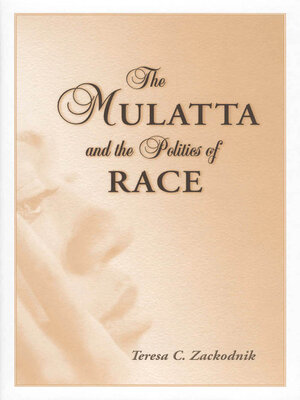
Sign up to save your library
With an OverDrive account, you can save your favorite libraries for at-a-glance information about availability. Find out more about OverDrive accounts.
Find this title in Libby, the library reading app by OverDrive.



Search for a digital library with this title
Title found at these libraries:
| Library Name | Distance |
|---|---|
| Loading... |
From abolition through the years just before the civil rights struggle began, African American women recognized that a mixed-race woman made for a powerful and, at times, very useful figure in the battle for racial justice.
The Mulatta and the Politics of Race traces many key instances in which black women have wielded the image of a racially mixed woman to assault the color line. In the oratory and fiction of black women from the late 1840s through the 1950s, Teresa C. Zackodnik finds the mulatta to be a metaphor of increasing potency.
Before the Civil War white female abolitionists created the image of the "tragic mulatta," caught between races, rejected by all. African American women put the mulatta to diverse political use. Black women used the mulatta figure to invoke and manage American and British abolitionist empathy and to contest racial stereotypes of womanhood in the postbellum United States. The mulatta aided writers in critiquing the "New Negro Renaissance" and gave writers leverage to subvert the aims of mid-twentieth-century mainstream American culture.
The Mulatta and the Politics of Race focuses on the antislavery lectures and appearances of Ellen Craft and Sarah Parker Remond, the domestic fiction of Pauline Hopkins and Frances Harper, the Harlem Renaissance novels of Jessie Fauset and Nella Larsen, and the little-known 1950s texts of Dorothy Lee Dickens and Reba Lee. Throughout, the author discovers the especially valuable and as yet unexplored contributions of these black women and their uses of the mulatta in prose and speech.
The Mulatta and the Politics of Race traces many key instances in which black women have wielded the image of a racially mixed woman to assault the color line. In the oratory and fiction of black women from the late 1840s through the 1950s, Teresa C. Zackodnik finds the mulatta to be a metaphor of increasing potency.
Before the Civil War white female abolitionists created the image of the "tragic mulatta," caught between races, rejected by all. African American women put the mulatta to diverse political use. Black women used the mulatta figure to invoke and manage American and British abolitionist empathy and to contest racial stereotypes of womanhood in the postbellum United States. The mulatta aided writers in critiquing the "New Negro Renaissance" and gave writers leverage to subvert the aims of mid-twentieth-century mainstream American culture.
The Mulatta and the Politics of Race focuses on the antislavery lectures and appearances of Ellen Craft and Sarah Parker Remond, the domestic fiction of Pauline Hopkins and Frances Harper, the Harlem Renaissance novels of Jessie Fauset and Nella Larsen, and the little-known 1950s texts of Dorothy Lee Dickens and Reba Lee. Throughout, the author discovers the especially valuable and as yet unexplored contributions of these black women and their uses of the mulatta in prose and speech.







